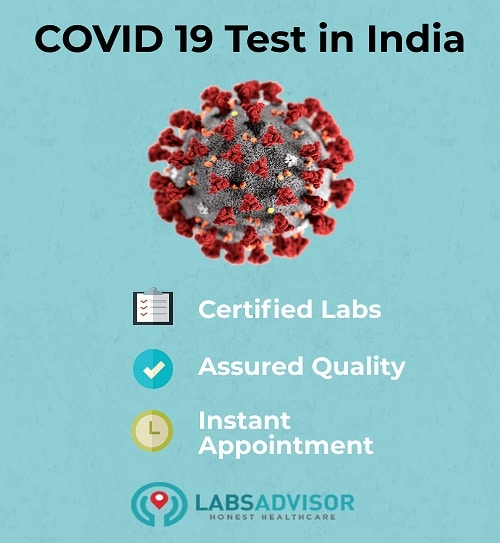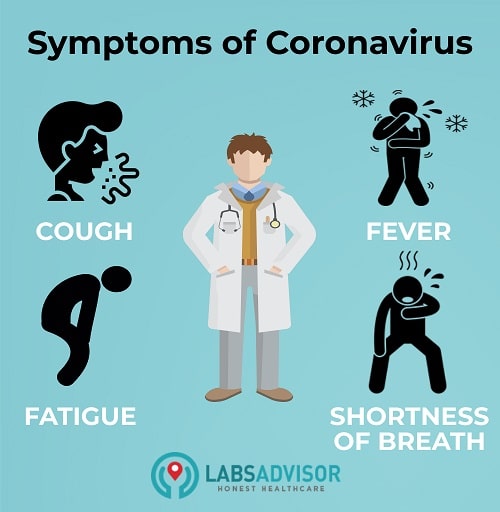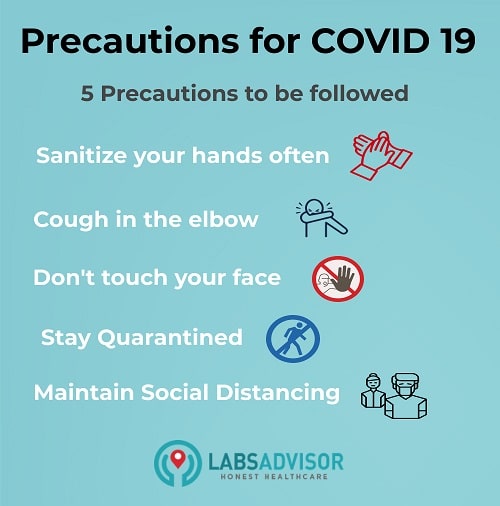
The novel Coronavirus (SARS-CoV-2) / COVID-19 has been a Global outbreak since December 2019 when it was first identified in Wuhan, China. It has been declared a pandemic by the World Health Organization on March 11, 2020.
Statistics by the Ministry of Health and Family welfare of India say that 1,12,000 active cases (as of May 21, 2020) have been reported and the number keeps jumping every day in our country.
Coronavirus Testing Labs through Labsadvisor
The below mentioned are the COVID 19 test price in India along with the labs through Labsadvisor.
Mumbai:
COVID 19 test cost in Mumbai is done in Suburban Diagnostics with home collection availability at an affordable price of ₹4500 only.
Delhi:
COVID 19 test cost in Delhi is done in Prognosis Laboratories with the availability of home collection and also in SRL Diagnostics at an affordable price of ₹4500 only. We are working to extend our service across India.
The COVID 19 test will be conducted only if the patient has the doctor’s prescription.
Call us to the following number to know your COVID 19 test cost and to book your Coronavirus test near your location.
If you want us to call you back, click on the link below
Why trust LabsAdvisor for my scan?
|
The article below covers all the important topics that are related to Coronavirus in general, COVID-19 test cost, what are the symptoms of the Coronavirus / COVID-19, how are they transmitted from person to person, their treatment, and precautions to be undertaken to protect from the virus.
Brief about Coronavirus
Coronavirus (COVID-19) is a new illness that can affect your lungs and respiratory tracts. Studies show the virus is transmitted among people mostly through making human contact or shaking hands or by breathing the air where someone with a virus has sneezed and coughed, and exposed to objects or surfaces and then touching the eyes, mouth, or other parts of the body.
As the symptoms of Coronavirus infection do not show upon early-stage say up to 14 days, If you have been exposed to another person with COVID-19 or traveled to an affected country, if taken a cruise in the past 14 days or live in an area where the ongoing spread of the disease is prevalent, we highly recommend you to take a test at a nearby Laboratory.
How does the Coronavirus COVID-19 spread?
Coronavirus COVID-19 is transmitted among humans by the respiratory droplets coming out of an infected person when a healthy and active person being in proximity of fewer than 6 meters inhales or comes in contact can get affected. Thus the virus is transmitted by;
- Cough.
- Sneeze.
- Touching the places where the infected person has come in contact with i.e. tabletop, doorknob, etc.
- Coming in physical contact with the affected like shaking hands.
Unlike smallpox and other air-borne diseases, it is believed that new Coronavirus is not transmitted via air. Scientists are still learning about the various other ways how the virus transmits from person to person.
What are the symptoms of being infected by Coronavirus COVID-19?
Sometimes you won’t experience any sign of symptoms of Coronavirus up to 14 days since the day of exposure to the virus. Certain symptoms indicate whether you are affected by the Coronavirus COVID-19, they are;
- Fever.
- Cough.
- Difficulty in breathing / Shortness of breath.
- Fatigue.

If your symptoms are similar and if you experience any persistent pain in the chest or bluish lips or face, then you must immediately reach out to your nearby Lab or testing center to test about the conformation of the Coronavirus COVID-19.
All the types of Coronaviruses family which are discussed below have a common manifestation and potential, which is to cause respiratory illness in humans.
What are the types of Coronavirus?
Currently, there are seven types of Coronaviruses that have been common among animals and in very rare cases they have spread to Humans.
In which four of the Coronaviruses are considered not very serious and don’t need to be worried much as they show minor and easily curable symptoms like fever, running nose, headache, sore throat which is mild upper-respiratory diseases.
Nonetheless, these viruses can also lead the infected person in serious conditions if they are not taken care of at its early stage or when the person has a weak immune system like people at their elderly age.
What is Coronavirus and its types?
The following 3 types of Coronaviruses show severe symptoms and have caused multiple deaths in Humans.
One, Middle East Respiratory Syndrome (MERS) is a family of Coronavirus which is recognized by symptoms like cough, fever, shortness of breath, and in some cases, it leads to Pneumonia. This type survives in the desert countries where there is high temperature and low moisture, like Saudi Arabia where MERS originated and believed it continues to occur in that region.
Secondly, Severe Acute Respiratory Syndrome (SARS) is also a family of Coronavirus that causes symptoms like body ache, fever, and chills and often leads to Pneumonia. When it was prevalent during the year 2002, this deadly disease has infected almost 8000 people and claimed over 800 lives.
Then comes the recent COVID-19 (SARS Co-V2) which has claimed over thousands of lives by causing illness in humans by causing severe respiratory illnesses like shortness of breath, fever, cough, and dry throat and leading to Pneumonia. This type was first identified in China in December 2019.
Testing of Coronavirus COVID-19
Molecular method:
The most commonly used method for testing by many countries including the United States is a real-time reverse transcription-polymerase chain reaction(RRT-PCR), also known as a reverse-PCR test.
Through this process, testing can be done on respiratory samples obtained by various methods like nasopharyngeal swab where the physicians collect the sample from the back of the nose and throat by using narrow sticks made of a short plastic rod covered, at one tip, with adsorbing material like cotton, polyester or flocked nylon.
The affected person’s sputum samples and blood samples can also be provided to the physicians in the given specimen tube. The samples will be sent to the lab and the results are generally available within a few hours to 2 days.

How is the Coronavirus COVID-19 infection treated?
There are no official vaccination or Pharmaceutical drugs to treat the Novel-Coronavirus but still, one can get cured if reported at the early stages of the symptoms.
Researches from John Hopkins University in Baltimore say that there might be a possible way to slow down and to treat the virus by collecting and transfusing the blood serum of those who have already been recovered from the Coronavirus.
Still, it is not assured about the effectiveness of how it will work in the case of COVID-19. A similar strategy was used to eradicate polio and measles several decades ago.
Is Coronavirus curable?
When you’re tested positive of Coronavirus and if you are young having a healthier immune system Doctors advise you to stay quarantined at home and avoid contact with other people and taking lots of fluids and staying hydrated may result in the betterment and there is a chance of getting fully cured.
For adults over 60 years of age and those with chronic conditions such as diabetes, heart disease, lung disease might have a weak immune system.
If the symptoms of the Coronavirus get intense, it is recommended to get admitted and treated at the Hospital.
What are the precautions that can be taken to protect ourselves from the Coronavirus Covid-19?
As there is no Coronavirus vaccine or antibiotic against the COVID-19, the best thing you can do is to take care of yourself the way you would to prevent yourself from getting the virus.
You know you can be affected when people sneeze and cough on you, or when you touch a doorknob. Washing hands at regular intervals—especially before eating and touching your face, and after going to the bathroom—and avoiding contact with other people who are sick will be the best strategies.
The following are some preventive measures can be taken to stay away from the COVID-19:
- Staying home when you are sick is highly recommended.
- Avoid going to crowded places.
- Cleansing your hands with soap and water for at least 20 seconds, after you come home from outdoors. If soap isn’t available, you can use a hand sanitizer with at least 60% alcohol.
- Use a tissue to cover a cough or sneeze, then dispose of it in the trash. In case of unavailability of tissue try to cough/sneeze into your bent elbow.
- Avoid touching nose, eyes, and mouth.
- Use a household wipe or spray to disinfect doorknobs, light switches, desks, toilets, cell phones, and other objects and surfaces which are frequently touched.
Considering the usage of masks, it has been proven that Coronavirus does not spread through the air hence, the use of a mask is not recommended.
However, it is advisable to use face masks for people who have symptoms of COVID-19 to avoid further spreading of the virus to others.
Other topics you may want to read about:
- Liver Function Test Cost in India
- HCV Test Cost in India
- Thyroid / TFT Test Cost in India
- Kidney Function Test Cost in India
- Complete Blood Count / CBC Test Cost in India






